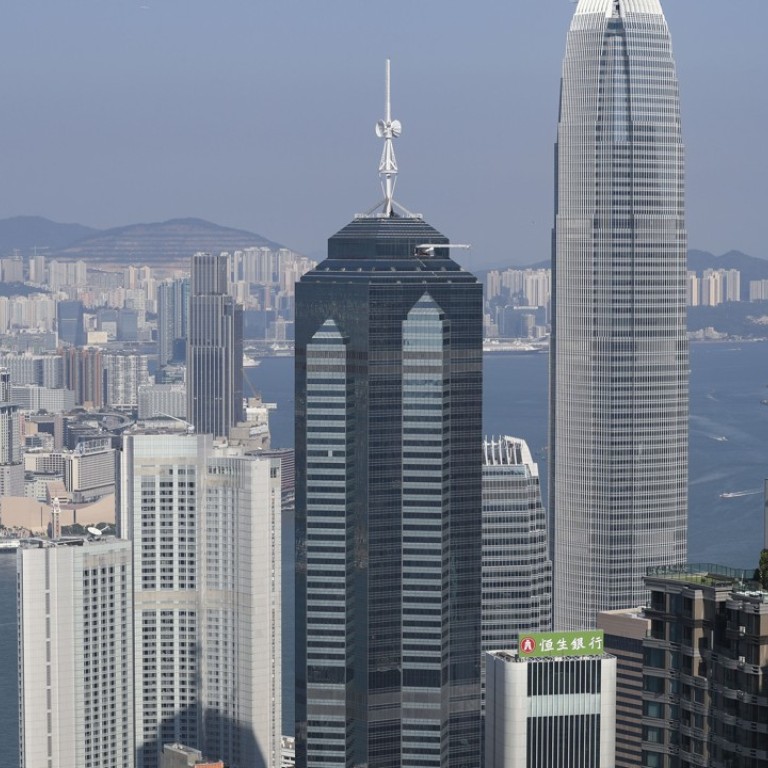
Exclusive | The Center is back in Hong Kong hands as mainland firm pulls out of buying world’s costliest tower
Pollyanna Chu, Hong Kong’s richest woman of 2017 according to Forbes, and Shimao Property Holdings’ founder Hui Wing Mau, have replaced the mainland shareholder in the group that’s buying Li Ka-shing’s The Center
Two Hong Kong-based tycoons have emerged to replace a mainland Chinese shareholder in the consortium that bought Li Ka-shing’s The Center tower, barely three months after the C.H.M.T Peaceful Development Asia Property group hogged the media spotlight as owners of the world’s priciest office building.
Pollyanna Chu, Hong Kong’s richest woman of 2017 according to Forbes, and Shimao Property Holdings’ founder Hui Wing Mau, have taken up the 55 per cent stake owned by China Energy Reserve & Chemicals Group in the consortium, according to several people familiar with the matter. The group agreed in November to pay HK$40.2 billion (US$5.15 billion) for the building.
The remaining four shareholders of the consortium, comprising Hong Kong investors David Chan Ping-chi, Lo Man-Tuen, Raymond Tsoi Chi-chung and Ma Ah Mok, will remain in the group, the people said.
“I’m confident in the prospect of Hong Kong’s office market, otherwise I wouldn’t invest in it,” Chu told the South China Morning Post by phone, confirming her investment. None of the investments involve publicly listed companies, she added, declining to disclose the size of her share in the consortium.
Chu’s Hong Kong-based Kingston Financial Group, which provides financing services and operates hotels and casinos in Macau, had HK$2.9 billion in revenue in the year ended March 2017. Property tycoon Hui, also known as Xu Rongmao in China, donated a 133 million yuan (US$21 million) painting called the Landscape Map of the Silk Road to the Palace Museum in the Chinese capital last November. Hong Kong-listed Shimao reported HK$40.54 billion in first-half revenue last year.
Spokespeople at Li’s flagship CK Asset Holdings declined to comment. A spokesman at China Energy Reserve’s Hong Kong office, who would only disclose his surname Lv, confirmed that the Beijing-based company had completely pulled out from the purchase, adding that the withdrawal was a “commercial decision.”
Li’s company announced the sale of the 73-storey tower, Hong Kong’s fifth-tallest building and the tallest in the tycoon’s portfolio, in November.
Li, who turns 90 in July, has been seeking to sell the building for at least a year, as he sought to trim his Hong Kong assets. Estimated at more than HK$35 billion by valuers, The Center attracted the attention of a handful of deep-pocketed Chinese buyers including the Industrial & Commercial Bank of China (ICBC), one of the mainland’s largest state-owned lenders.
However, no deal was reported for many months, due mostly to a Chinese government crackdown on capital remittances and aggressive overseas acquisitions, which gummed up transactions and approvals to move funds offshore.
The tower in downtown Central has 1.2 million square feet (111,483 square metres) of office space, with 13,000 square feet of retail space and 402 car parking lots.
The building, completed in 1998, is an entire steel structure without a concrete core. Its iconic lobby was featured in the Hollywood movie The Dark Knight.
CK owns 48 storeys in the building after Malaysian developer Guoco Group bought 11 floors in 1997. Nine of the 11 floors were sold to Singapore’s DBS Group Holdings Co. in 1998, while CK sold the 60th and 79th floors in 1999, according to The Center’s sales brochure.
Li has sold more than 20 billion yuan of commercial properties in Shanghai, Beijing and Guangzhou since 2013. The tycoon’s business empire covers container ports, phone networks, power plants, real estate, retail outlets with assets in Asia, Europe and North America.
Additional reporting by Tony Cheung and Sandy Li in Hong Kong

